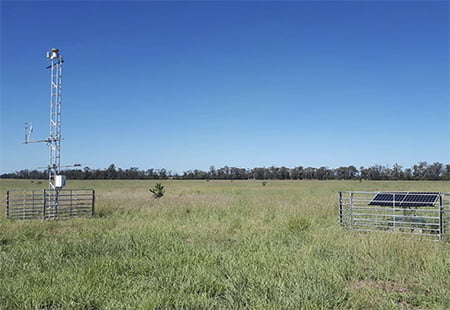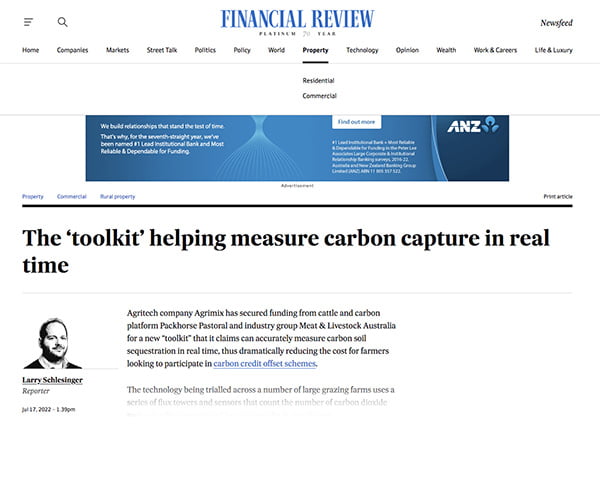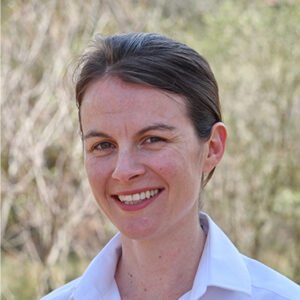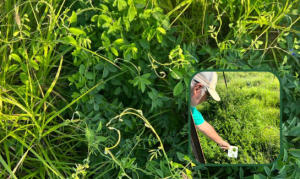Agrimix’s scientific research study into eddy covariance flux aims to reduce soil carbon measurement cost by 90 percent
In what is being hailed as a major milestone for Australia’s agricultural industry, Australian owned agricultural technology company Agrimix has announced it is on track to deliver a scientifically backed, state-of-the-art toolkit which will dramatically reduce the cost of soil carbon measurement by up to 90 percent for rural landowners.
The breakthrough technology will enable farmers and landholders across the country to access and benefit from the fast-growing carbon credit market, often out of reach due to the high cost and variable accuracy of current soil carbon measurement technologies.
Agrimix is the first company in Australia to commission a large-scale scientific research study into eddy covariance flux tower technology, in collaboration with Queensland University of Technology’s Professor Peter Grace and Associate Professor David Rowlings.
Agrimix has received support for this study from major industry players including Meat & Livestock Australia and regenerative cattle property investment company Packhorse.
For over twelve months, a network of flux towers across grazing properties in QLD and NSW have been remotely measuring carbon and water flows into and out of plants and soil at a rate of twenty times per second, every day of the year.
This massive amount of high frequency time series data has enabled the natural processes driving plant growth and carbon sequestration to be understood in greater detail. Results show combining this big data with internationally recognised soil carbon models and state-of-the-art remote sensing technologies, creates a robust platform enabling farms to monitor and drive productivity
and ESG outcomes in real time.
Ben Sawley, CEO Agrimix, said the company is collaborating with an international team of world-renowned soil carbon and eddy flux scientists to develop a trusted and credible measurement tool.
“The significance of our flux tower research is ground breaking due to the quality and expertise of our science team and their partnerships. They are world class,” said Mr Sawley. “The opportunities to increase productivity and sequester carbon in Australia are large based on improving pasture land performance, however major barriers to landholders realising carbon credits have been high cost and variable accuracy.
Currently the cost to measure soil carbon through drilling soil cores and transporting them to a lab for analysis can be more than $30 per hectare, which makes the carbon credit market unattainable for a significant proportion of landholders. We are focussed on delivering the most accurate, scientifically proven and economical soil carbon measurement and modelling toolkit
available.”
Mr Sawley added that other soil carbon measurement systems which are based on soil testing, are very costly and compromised by the high variability of soil carbon across a paddock.
“In contrast, using a well-tested soil carbon model, frequently calibrated and validated with flux tower data, offers relatively low ongoing operating costs over large areas. We believe the eddy flux technique and our reference network will be a key component in modelling agricultural systems, enabling landholders to simulate soil carbon and productivity changes under different management
practices, before starting their projects.”John Scott, beef producer at ‘Allandale’ in Roma, QLD said Agrimix’s new technology is highly anticipated and will lead to an uptake of soil carbon projects across Australia.
“While many farmers and graziers want to participate in carbon sequestration projects to maximise their land and help the environment, the barriers are substantial,” said Mr Scott. “This is news we’ve been waiting for as it will enable us to use a trusted measurement tool to realise commercial opportunities on our land while supporting the environment.”
The flux tower-based technology is being developed and validated by QUT on multiple properties in Queensland and NSW including on Packhorse’s 10,029-hectare Moolan Downs property.
Tim Samway, Chair of Packhorse Investments Australia said the collaboration with Agrimix and QUT to develop and validate the effectiveness of flux tower technology was extremely attractive considering Packhorse is accumulating 2 million hectares of rural pastoral property with strong productivity improvement and carbon capture potential.
“As organisations globally pledge net zero targets, an increasing quantity of carbon credit units will be required to offset emissions,” said Mr Samway. “Soil carbon is a key low-emissions technology, so further development of affordable and accurate technology such as flux towers and soil carbon models is a game-changer.
But not all approaches to measuring soil carbon changes are created equal and it is critical that landholders seek out scientifically proven and tested methods to maximise their investment in this technology and generate the most accurate information.
The carbon credit market grew to US$851m in 2021* so it is exciting to be a part of developing Australian-led initiatives that enable landholders to participate and profit from this fast-emerging market.”
Learn more about Agrimix’s soil carbon measurement project here.
Agrimix Soil Carbon Measurement Project in the News
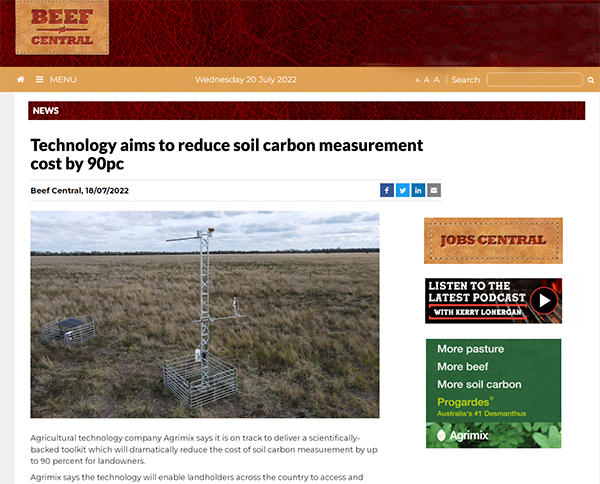
Beef Central (20/07/20220)
Australian Financial Review (17/07/2022)
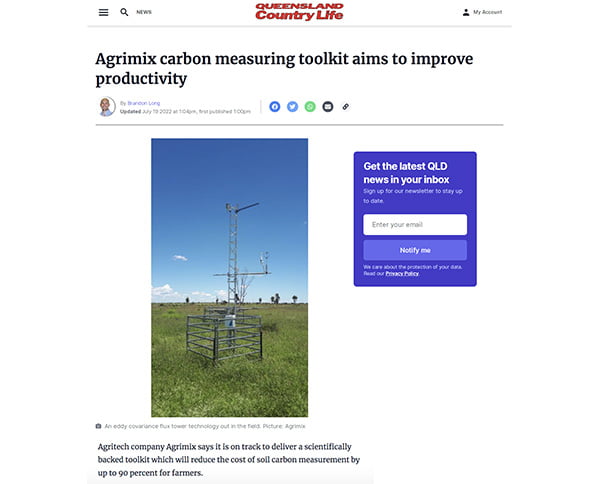
Queensland Country Life (19/07/2022)

